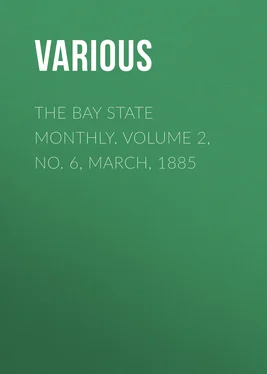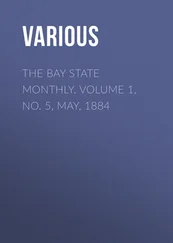Various - The Bay State Monthly. Volume 2, No. 6, March, 1885
Здесь есть возможность читать онлайн «Various - The Bay State Monthly. Volume 2, No. 6, March, 1885» — ознакомительный отрывок электронной книги совершенно бесплатно, а после прочтения отрывка купить полную версию. В некоторых случаях можно слушать аудио, скачать через торрент в формате fb2 и присутствует краткое содержание. Жанр: foreign_antique, periodic, foreign_edu, на английском языке. Описание произведения, (предисловие) а так же отзывы посетителей доступны на портале библиотеки ЛибКат.
- Название:The Bay State Monthly. Volume 2, No. 6, March, 1885
- Автор:
- Жанр:
- Год:неизвестен
- ISBN:нет данных
- Рейтинг книги:3 / 5. Голосов: 1
-
Избранное:Добавить в избранное
- Отзывы:
-
Ваша оценка:
- 60
- 1
- 2
- 3
- 4
- 5
The Bay State Monthly. Volume 2, No. 6, March, 1885: краткое содержание, описание и аннотация
Предлагаем к чтению аннотацию, описание, краткое содержание или предисловие (зависит от того, что написал сам автор книги «The Bay State Monthly. Volume 2, No. 6, March, 1885»). Если вы не нашли необходимую информацию о книге — напишите в комментариях, мы постараемся отыскать её.
The Bay State Monthly. Volume 2, No. 6, March, 1885 — читать онлайн ознакомительный отрывок
Ниже представлен текст книги, разбитый по страницам. Система сохранения места последней прочитанной страницы, позволяет с удобством читать онлайн бесплатно книгу «The Bay State Monthly. Volume 2, No. 6, March, 1885», без необходимости каждый раз заново искать на чём Вы остановились. Поставьте закладку, и сможете в любой момент перейти на страницу, на которой закончили чтение.
Интервал:
Закладка:
The house has also produced other illustrated books, of artistic excellence. Among these Miss Jerome's "One Year's Sketch Book" has been declared to be without a rival, in its own field, while Miss Miner's "Orchids" must needs be seen to be appreciated.
But I have reached the limits placed upon this article. I have omitted to speak of many things of which I should like to say something. But the warp and woof of the story are here given, and the reader will easily discover therefrom that no secrets underly the firm of Lee and Shepard save,—industry at home, and integrity in all their dealings with the public.
Hon. Rodney Wallace
[Pastor of the Calvinistic Congregational Church, Fitchburg.]
This is not a biography, it is a sketch; possibly I might say it is an outline. At any rate the life of our subject can not be written till other chapters are added, and the end comes. May it be long delayed.
The intense culmination of forces in the busy period of a man's life renders it fruitful in material for a sketch. What a successful man, of marked force of character, has done, may be an incentive and an encouragement to others. Perhaps this was Longfellow's chief thought when he penned the "Psalm of Life:"
Lives of great men all remind us
We can make our lives sublime.
The lives of great men, and conspicuously that of the subject of this sketch, prove that, in this country, a boy need not be born with a silver spoon in his mouth, nor with a brilliant speech on his lips, to reach eminent success, and be held in high honor; but that the noblest results of a life of industry and frugality, and the highest honors any worthy ambition can crave, are within reach of the boy who has energy, courage, integrity of purpose, and purity of character. By their native energy some of the most conspicuous men of our time have made their way against obstacles which would have been too much for less sturdy wills. Whatever deficiencies there may have been in their early training were largely atoned for by native energy and force of character. Because this is all true of the subject of this paper, we tell the story in the hope that some other struggling boy may take courage from his example.
His Start In Life
Rodney Wallace was born in New Ipswich, New Hampshire, December 21, 1823, and is therefore in the full vigor of manhood. We may infer that his boyhood was not blessed with the advantages which usually crown the early life of so many lads, and strew their path with roses, from the fact that at the age of twelve he left home to work on a farm for wages, with agreement for limited opportunities for schooling. He is a son of David and Roxanna Wallace.
It seems likely that the family is of Scotch origin. David Wallace seemed to think so, since he dropped the spelling Wallis, and adopted the form in which the name is now written. In 1639, Robert Wallis was living in Ipswich, Massachusetts. Benoni Wallis, of this family, removed to Lunenburg and there married Rebecca Morse, of Lynn, July 2, 1755. She died in Lunenburg August 25, 1790, and he died March 15, 1792. David, son of Benoni and Rebecca Wallis, was born October 16, 1760. He married Susannah Lowe, and lived in Ashburnham where he died January 14, 1842. David, son of David and Susannah Wallis, was born at Ashburnham July 14, 1797. He married July 8, 1821, Roxanna Gower of New Ipswich, where he lived till he removed to Rindge, New Hampshire, in 1846. He died at Rindge, May 29, 1857; and his wife died at Fitchburg, February 27, 1876. He was the first of his family in this country to adopt the spelling Wallace, instead of Wallis. He had eight children, of whom the subject of this sketch was the second.
As we have said, at the age of twelve, when most lads are comfortably cared for at home, young Wallace started out in life for himself. He let himself to a farmer for forty dollars for the first year, with the privilege of attending school eight weeks in the winter. It turns out that the first forty dollars he earned were the beginning of a large fortune, without a dishonest dollar in it, and that the eight weeks of schooling of that winter on the farm, was the beginning of a knowledge, gleaned here and there as opportunity offered, which fits him for prominent positions of trust and responsibility.
At an early age, sixteen I think, he was charged with the responsibility of driving freight teams from Rindge to Boston, returning with loads of merchandise. In the discharge of this trust he displayed the energy, tact, and trustworthiness which were prophecies of the man. He was taking his first lessons in the school of business, and proved himself an apt scholar.
Dr. Stephen Jewett was a somewhat notable physician of Rindge. His fame in the cure of chronic and acute diseases was wide spread. He was frequently called upon to make professional visits in Boston and other New England cities and towns. His medicines attained a wide celebrity. Their manufacture and sale became a large and lucrative business, and was carried on after the death of Dr. Jewett, by his son, Stephen Jewett, Jr. The energy which young Wallace had already shown induced Mr. Jewett to put the whole business of selling these medicines into his hands. He entered into this employment in 1843, at the age of twenty, and continued in it till he came to Fitchburg in 1853. In selling these medicines he travelled over five of the New England States. He said to the writer that this was a good school in geography for him, for he became acquainted with the topography of these states, and the location of all their important places.
Such were the beginnings of a business career of great prosperity. It was in these ways that he got his start in life, and in these lesser employments he proved himself worthy of and equal to the greater tasks yet before him. Here he showed the same judgment and far-sighted wisdom, which have marked his career in the larger, more conspicuous circles of the business world, and won him a name which is everywhere repeated with respect, and a reputation for integrity and honest dealing which any man might covet.
His Business Life
In 1853 Mr. Wallace came to Fitchburg and entered upon that period which, for convenience, I have named his business life. He formed a co-partnership with Stephen Shepley, known as Shepley and Wallace. They were wholesale dealers in books, stationery, paper-stock, and cotton-waste. This firm continued under the name of Shepley and Wallace, and R. Wallace and Co. till July 1, 1865. On this day the firm dissolved, and the business was divided. Mr. Wallace took the department of paper-stock and cotton-waste, which he still carries on. To what proportions it has grown, under his management, may be judged from the fact that the business done amounts at least to $200,000 a year.
December 31, 1864, Stephen Shepley, Benjamin Snow, and Rodney Wallace bought the Lyon Paper Mill and the Kimball Scythe Shops at West Fitchburg, and began the manufacture of paper under the name of the Fitchburg Paper Company, Stephen E. Denton was taken into the firm as a partner soon after. He had charge of the business at the mill. In July, 1865, Rodney Wallace and Benjamin Snow bought the interest of Stephen Shepley; and the Fitchburg Paper Company was then Wallace, Snow, and Denton. Mr. Denton died in June,1868. January 7, 1869, Mr. Wallace bought the interest of Benjamin Snow. January 23 of the same year he bought the interest of Mr. Denton's estate of his widow, who was at that time residing in New York. From that date till the present the Fitchburg Paper Company is Rodney Wallace. He retains the old firm name.
Since becoming sole owner, he has added largely to the original property. A neat village of dwellings has grown up around his mills, which deserves a name of its own. Wallaceville would be an appropriate name. He has put in a substantial stone dam at great expense. In 1878 he erected a new brick mill, with all the modern improvements, doubling the capacity of the establishment. It is now capable of producing from 15,000 to 18,000 pounds of paper every twenty-four hours. Just across the Nashua River is the Fitchburg Railroad. He has a freight station of his own, where he receives all his freight and ships all his paper.
Читать дальшеИнтервал:
Закладка:
Похожие книги на «The Bay State Monthly. Volume 2, No. 6, March, 1885»
Представляем Вашему вниманию похожие книги на «The Bay State Monthly. Volume 2, No. 6, March, 1885» списком для выбора. Мы отобрали схожую по названию и смыслу литературу в надежде предоставить читателям больше вариантов отыскать новые, интересные, ещё непрочитанные произведения.
Обсуждение, отзывы о книге «The Bay State Monthly. Volume 2, No. 6, March, 1885» и просто собственные мнения читателей. Оставьте ваши комментарии, напишите, что Вы думаете о произведении, его смысле или главных героях. Укажите что конкретно понравилось, а что нет, и почему Вы так считаете.












